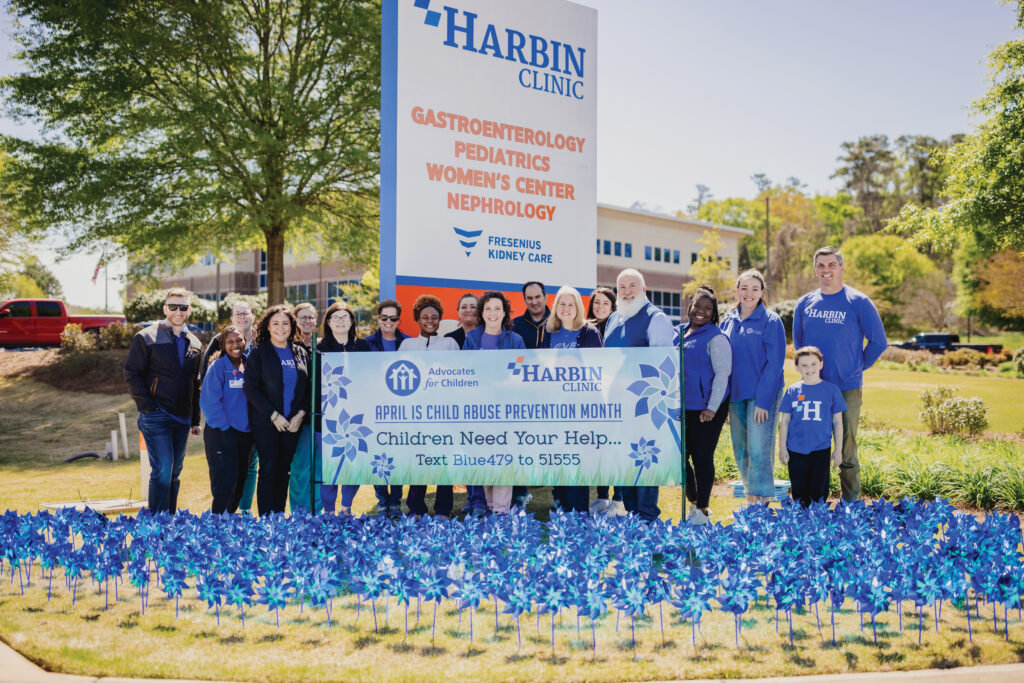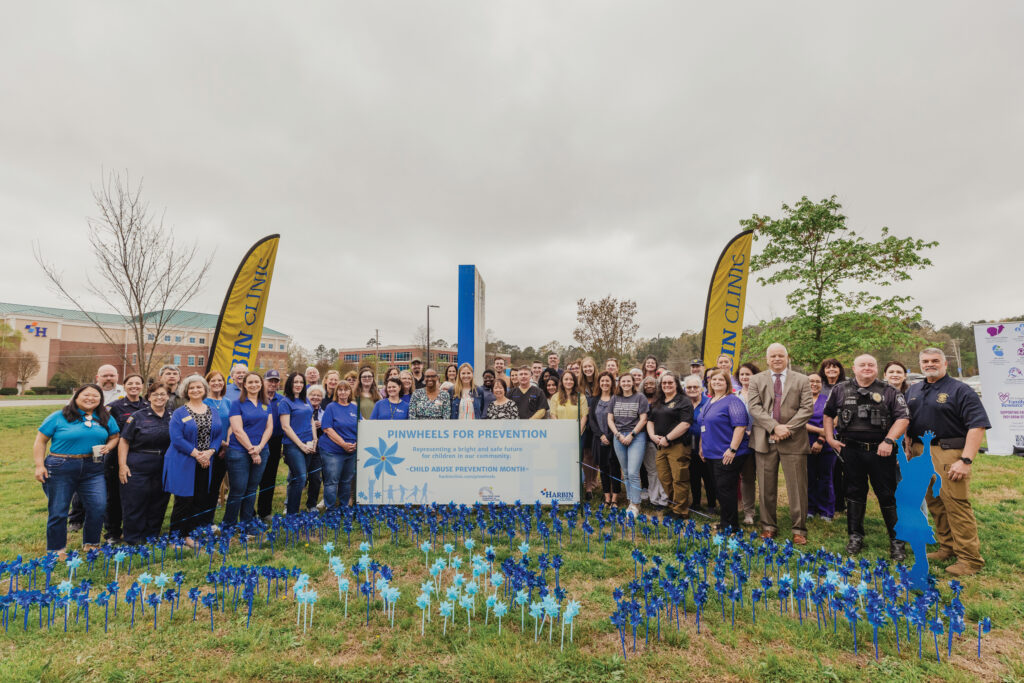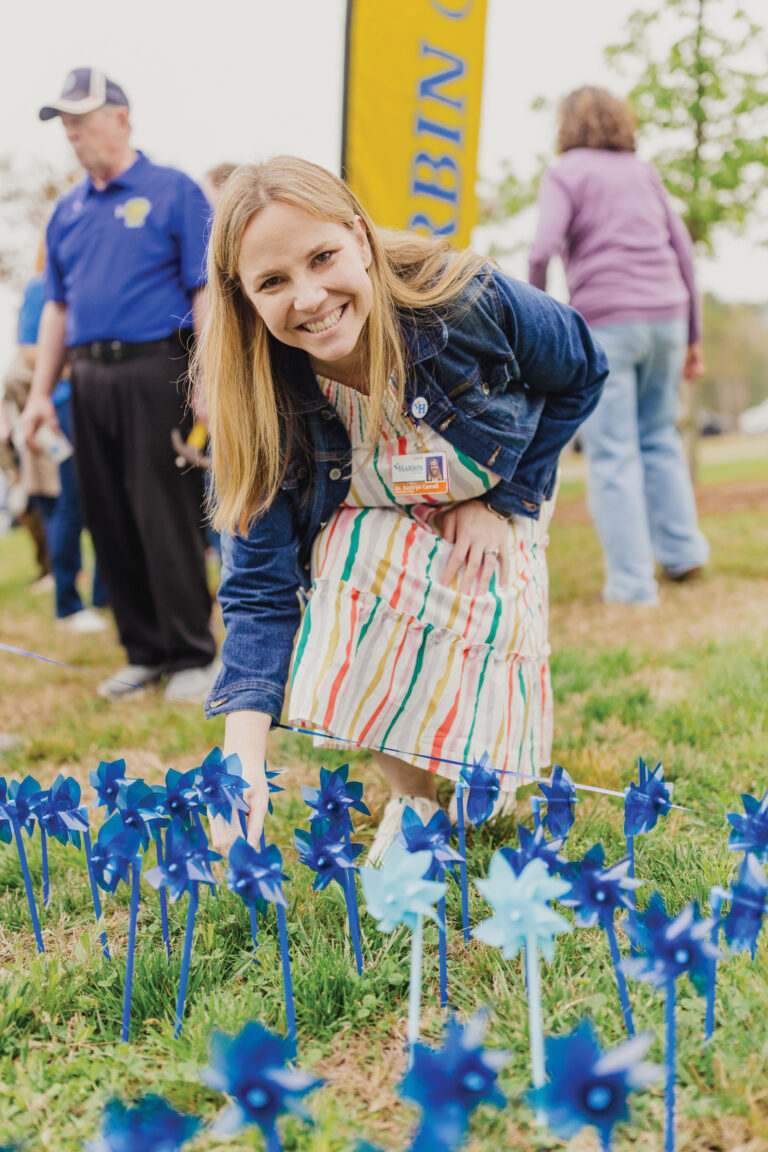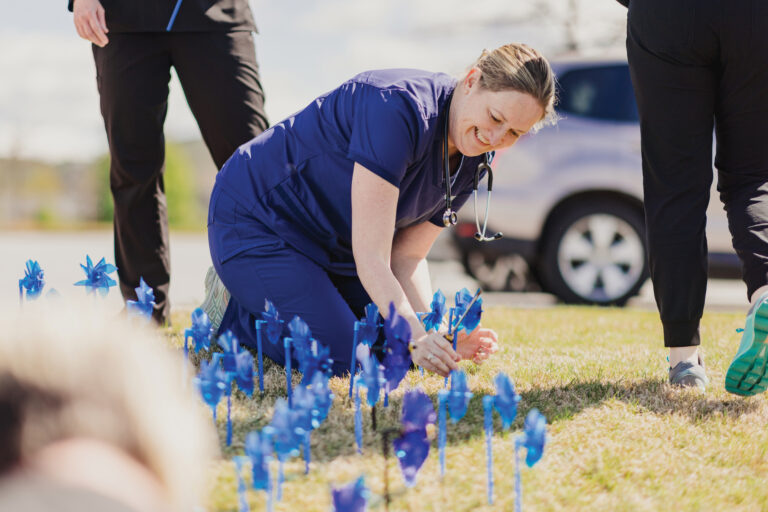
Harbin Clinic Pediatrics Cartersville with Advocates for Children
April is Child Abuse Prevention Month. Each year Harbin Clinic partners with nonprofits throughout the region to promote awareness and to provide encouragement, education and practical help for our children and families.
Providers and advocates plant gardens of countless twirling blue pinwheels outside Harbin Clinic facilities, serving as a poignant representation of the connection between a happy childhood and a hopeful future for every child. The pinwheels are also a reminder of the local communities’ opportunity to make a difference in the lives of at-risk children.
Community Partners
Harbin Clinic works with four regional community partners to combat child abuse including Advocates for Children, Exchange Club Family Resource Center, Polk Family Connection and Family Resource Center of Gordon County. Each organization meets the needs of families in their area in unique ways.
For example, partners like the Exchange Club Family Resource Center, support parents who feel overwhelmed and, sometimes, a bit hopeless. Executive Director Tina Bartleson says, “We work with families every week for one to two hours for up to a year. Families may have a colicky baby, or maybe they’re unsure how to raise their children in supportive, healthy ways. So, we bring in information about child development, parenting, life skills, budgeting—anything they need to deal with the challenges they’re facing.”
Talking with these different organizations in the region, many agree that misinformation has been a major caregiving stressor in recent years. Deciphering what is good parenting information and what is misinformation can feel stressful coupled with everyday parenting issues.
“It’s our role to walk with parents, helping them find good information and implement positive changes in their lives,” says Bartleson. “Our whole system is based on trust and relationships. Some parents are hesitant to get involved at first, but they often later say, ‘Please don’t go!’”
Beyond sharing resources with families, these partner organizations offer a variety of programming for caregivers and parents such as Advocate for Children’s First Steps program. With First Steps, Advocates for Children visited over six hundred babies in the hospital last year, giving new families immediate support while still in the hospital.
Each organization creatively meets the needs of families, but also expresses the importance of families knowing that they don’t need to be in a state of crisis to receive resources and help. The organizations furthered explained this is the power of Harbin Clinic pediatricians. They already have a relationship with caregivers and play a key role in sharing about partner organizations with patients and families during appointments.

Supporting Parents Throughout Development
Harbin Clinic pediatricians manage the physical, mental and emotional well-being of their patients in every stage of development. Children see their pediatrician for an average of 15 well-child visits in their first five years, so building a strong relationship with a healthcare provider early on helps equip families with tools to support children’s emotional, social and cognitive development.
Dr. Kathryn Carroll, a Harbin Clinic pediatrician says, “Parenting is one of the best and hardest jobs on the planet, and I am grateful for the partnership we have with our community partners. The Centers for Disease Control reports that in the US, at least 1 in 7 children have experienced child abuse or neglect this past year, and that number is too high. We must continue to support nurturing relationships between parents and children in our community.”
Digital Awareness
Recently, Harbin Clinic Pediatrics has also called attention to parenting and internet safety, reminding caregivers that the digital tools society uses every day to connect and share information — social media, online gaming, text and e-mail — are now used as avenues of abuse. According to the National Center for Missing and Exploited Children, the two greatest internet safety concerns for children are Child Sexual Abuse Material (CSAM), which includes any visual depiction of sexually explicit content involving minors, and the enticement of children online. This term refers to predators communicating online with someone believed to be a child with the intent to commit abuse.
Beyond understanding safety concerns, Harbin Clinic also wants to equip caregivers with confidence in helping children navigate appropriate developmental steps in their online independence. Just as there are milestones that allow for more independence in the real world, there are developmentally appropriate steps toward independence in the digital world.
This April, as individuals confront the sobering statistics regarding child abuse and neglect, Harbin Clinic and their partners emphasize the impact that education and intervention play in breaking the cycle of abuse. By equipping caregivers with accurate information and tools, our community can create safer, happier environments for all children. To learn more, visit harbinclinic.com/pinwheels.













